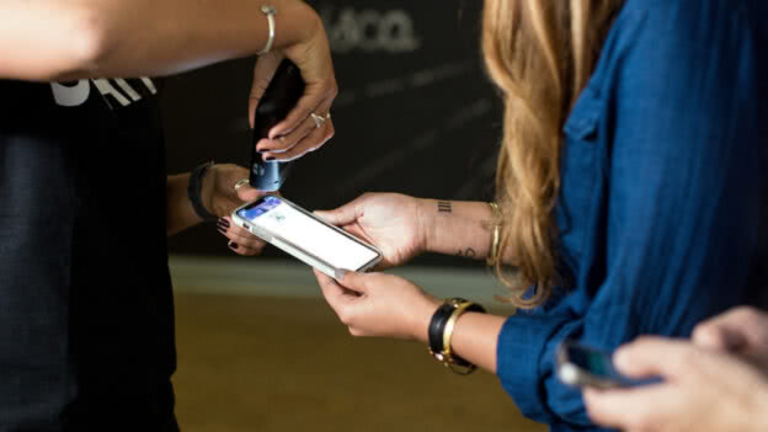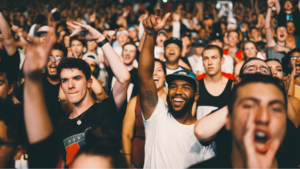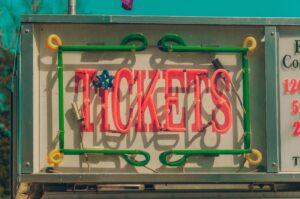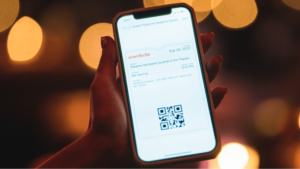There is no sweeter phrase for an event creator than “sold out,” but did you know that by selling different types of tickets, you can hear that phrase more than once?
Professional event organizers use multiple ticket types to improve sales and make the event more memorable for attendees. You can take your events to the next level by doing the same, and cash in on the $78 billion of ticket sales worldwide. Not sure what event ticket pricing strategies are right for you, or how to name a type of ticket? Here are eight common event ticket types and why you should use them.

1. General admission
The most common ticket-selling strategy is used by almost every event for bulk of admissions.
The general admission (GA) ticket type provides admission to your event without any extras. GA advance tickets are typically on sale for the longest time period, and are usually one of the least expensive types of tickets you can offer.
Why do event planning pros use general admission tickets?
General admission provides a baseline experience for attendees and is a staple in every concert ticket pricing strategy. It also helps you convert people who don’t want a VIP experience (or don’t want to pay for it).
What types of events need general admission tickets?
Most events use some GA tickets, but they’re especially useful for certain event types. The types of events that commonly rely heavily on GA tickets are:
- Events where there are areas of unassigned seating, or where there isn’t seating, such as concerts
- Events that are unlikely to sell out
- Events that offer free tickets and give away their GA tickets
- Events in wide open spaces where seating is less important, such as outdoor movies

How to create a general admission ticket with Eventbrite
General admission tickets are simple and easy to make in Eventbrite. Just make sure “reserved seating” isn’t checked when you create your event, and then go to the “Tickets” tab. There, you’ll be prompted to add tickets and you can adjust pricing, quantity, and sales dates according to your preferences.
2. Coded discount
If you’ve ever typed a code like SAVE50 to get a discount online, you’ve used a coded discount. But they’re not just for shopping, they’re perfect for events as well.
Targeted discounts give specific groups of attendees the option to purchase different types of tickets at a reduced price with a special promotional code. Coded discounts are familiar to consumers as well, with over 145 million Americans using them per year.
Why do event planning pros use coded and targeted discounts?
Discounts allow you to woo back past attendees, offer bulk discounts on ticket purchases from specific groups, and motivate recipients to act by a certain date.
Event organizers use these to kick off their pre-sale for return attendees, offer last-minute discounts, or partner with vendors to encourage at-event spending. As a result, you can encourage your guests to buy tickets earlier, buy tickets at the last minute if you have the capacity, and spend more with event vendors.
Coded discounts also allow you to target your most interested audience with tailored discounts that appeal to their specific interests. For example, if you’re targeting adults with kids, you can create a special discount for children.
What types of events need coded and targeted discounts?
Coded and targeted discounts are perfect for a couple types of events:
- Events targeted at a specific audience, such as niche conferences or children’s entertainment
- Events targeted at students and seniors, who are especially responsive to discounts

How to create a discount code with Eventbrite
To make a discount code in Eventbrite, go to the “Promo codes” section of the “Tickets” tab in your event. Then just click “Create promo code” and choose the discount amount, code, and other details for the discount. If you only want the discount to apply to certain tickets, you can specify that as well.

3. Reserved seating
Reserved seating tickets are a simple upgrade that can provide great value for attendees wanting to be closer to a performer or speaker at your event.
Reserved seating tickets are tickets for events that have a designated seating area or specific seats designated for ticket holders. This means that ticket holders have a guaranteed seat in a particular section or row, and their seats are reserved for them during the entire event.
Why do event planning pros use reserved seating tickets?
The people who want to be near the action will pay more for the privilege. So if your venue uses seating, you can charge more for the section closest to the performer or stage.
What types of events need reserved seating tickets?
Reserved seating tickets are usually for sit-down events with limited capacity such as:
- Events with high attendance, such as major sporting events
- Formal events, such as symphony concerts and plays
- Events where the location of the seat is important, such as movies

How to create reserved seating tickets with Eventbrite
To create reserved seating tickets in Eventbrite, start by selecting “Reserved Seating” toggle in the “Location” section of your event’s page. Then go to the “Tickets” tab to make your seat map and create a reserved seating layout.
4. Multi-day pass
If your event takes place over several days, give attendees the power to pick and choose the days they will attend. Radiofrequency identification (RFID) makes this type of ticket super easy to manage on the logistics side, so you don’t have to worry about the complexity of different variables.
A multi-day pass is a kind of ticket that lets you attend an event over the course of multiple days. Multi-day passes can be for the full duration of an event, or just for a few days. For example, you could sell a two-day pass for a weeklong event.
Why do event planning pros use multi-day passes?
A multi-day pass removes attendance barriers by giving people the freedom to choose which sessions or performances they attend, at a price they’re comfortable with. Identifying and removing attendance barriers is a pro skill that can increase total ticket sales.
What types of events need multi-day passes?
Most events that last more than one day will use multi-day passes. Some examples are:
- Events where people may want to see specific speakers over multiple days, such as conferences and conventions
- Events that people will travel long distances to, such as conferences and music festivals

How to create multi-day passes with Eventbrite
Multi-day passes are as easy to make as possible in Eventbrite. Simply change the names and pricing for the different passes you want to create and adjust your capacity for each type of multi-day pass. You can make as many different passes as you need.

5. Single-day pass
Like a multi-day pass, a one-day pass lets you expand your ticket-selling strategy.
This option lets you give attendees digital or in-person access to your event for one day, rather than every day of your multi-day event. Like many other ticket types, they can be combined with other types to make a day VIP pass, for example.
Why do event planning pros use single-day passes?
Some corporate conferences or multi-day festivals can pose a price challenge or scheduling conflict for interested people. Overcome both hurdles with a day-pass ticket option, so attendees can join for just the amount of time they desire.
What types of events need single-day passes?
Single-day passes are used for similar types of events as multi-day passes:
- Multi-day events where people might only want to see one day, such as music festivals
- Events that last all day, where people might want to come and go, such as conferences and conventions

How to create single-day passes with Eventbrite
Creating single-day passes in Eventbrite is very similar to making multi-day passes. You just need to make tickets the way you would with general admission or multi-day passes, and assign them each names according to what day guests can use them on.
6. Early bird discount
The most common use of this strategy is to provide attendees with the maximum discount on tickets during a predetermined pre-sale period. You can customize the duration of the early bird period and the discount amount offered to your event’s attendees. Providing a discount is a great way to honor those who click first.
An early bird discount is an offer for a lower base price if you buy by a certain date and time. You can create tiered discounts depending on how early customers buy their tickets. You can also offer certain benefits and amenities, such as VIP status or swag, with early bird tickets.
Why do event planning pros use early bird discounts?
For loyal fans or potential attendees, an early bird discount often provides enough of an incentive to convince them to save their spot before general admission opens up. This ticket-selling strategy gives you an early view of the number of committed attendees, which is helpful for venue and catering counts.
What types of events need early bird discounts?
Early bird discounts can be helpful for any event, as it gives the event managers revenue sooner rather than later. But they’re an especially good fit for a couple of different kinds of events:
- Repeating events looking to identify loyal or highly interested customers, such as annual or monthly conventions, concert series, or repeating speaking events
- Events that organizers can plan far in advance, such as plays or museum and art exhibitions

How to create early bird discounts with Eventbrite
To make an early bird discount with Eventbrite, create a new ticket type that you can sell as your early bird tickets. You can do that in the “Tickets” tab under “Create ticket.” Then, just set the “Sales end” date and time for when you want to stop selling the early bird discount.

7. VIP
Premium ticket tiers can help you attract new attendees — and make more money from your current audience.
VIP packages let you offer attendees an upgraded experience at a higher price. Premium ticket tiers can help you attract new attendees and make more money from your current audience.
VIP ticket packages often feature extras, such as premium seating or entrance to an exclusive meet-and-greet with the event speaker or performer(s). If you have the resources to provide this premium experience, this is the second most important type of ticket for driving revenue after GA.
Why do event planning pros use VIP tickets?
Offering VIP tickets not only generates more revenue due to their higher prices but also provides customers with a more exclusive and valuable event experience. For high-demand events like the Super Bowl, they can cost almost $30,000 per person.
VIP tickets can also cause FOMO (fear of missing out), further increasing profits. Some attendees experience serious FOMO when they see VIP tickets are sold out, as the perceive an increased value of your event because it’s in such high demand.
What types of events need VIP tickets?
VIP tickets are common at a variety of events. Some of those are:
- Events with a famous or unique person, such as speaking engagements and concerts
- Events with limited repeatability, such as a product launch
- Events with an exclusive atmosphere, such as charity galas

How to create VIP tickets with Eventbrite
Making a VIP ticket in Eventbrite is just like making any other custom ticket type. You click “Add tickets” in the “Tickets” section of your event, name the VIP tickets, and set the amount you want to sell and the price.
8. Tickets at the door
No matter how great your marketing strategy for selling tickets is or what kinds of discounts you offer, there will always be some attendees who will wait until the very last minute to purchase tickets. Make extra sales on the day by allowing attendees to purchase tickets at the door.
“Day-of” or “door sale” tickets are tickets sold at the event venue, usually on the exact date of the event. For example, a theater production that hasn’t sold out will often sell tickets at the door.
Why do event planning pros sell tickets at the door?
If you haven’t managed to sell out your event in advance, these tickets can help fill empty spots. People buying tickets at the door also know they aren’t getting any early bird discounts, and you can charge full price.
Additionally, selling at the door sends two signals that tell people your tickets are valuable: scarcity and a line out the door. Scarcity is a powerful signal that psychologists have proven makes people think something is more valuable. If you reserve certain tickets for door sales, it creates a sense of urgency for people to buy the tickets available ahead of time.
It also means you’re likely to have a line of people waiting to buy their tickets. The fact that people are excited about your event and willing to wait in line for it is a valuable advertisement in itself
What types of events need day-of ticket sales?
You can sell tickets at the door for any event, but they’re most common with the following event types:
- Events that happen with low notice, such as pop-ups
- Events with fixed capacity and costs that might not sell out beforehand, such as theater productions and movies
- Events happening in venues that have other events happening concurrently, such as a comedy performance in a bar

9. Mobile tickets
Mobile tickets are a great way to augment any of the other ticket types here. By letting people access their tickets on their phones, you can provide greater convenience, multiple options to access tickets for the forgetful, and improved analytics on ticket use.
Mobile tickets are exactly what they sound like: tickets available on attendees’ mobile devices. Often, those come in the form of barcodes or event QR codes displayed on smartphones.
Why do event planning pros use mobile ticketing?
With mobile ticketing, people get their digital ticket sent to their email or phone, from where they can access and present it at the door. Mobile tickets also help cut down on fraud as each one is usually customized for a single person. Plus, you can use mobile tickets to track attendance in real-time and keep detailed records of who bought what tickets.
It’s important to note that while mobile ticketing is a great way to better manage your events, it also means your attendees have to remember to charge and bring their phone with them!
What types of events need mobile tickets?
You can use mobile tickets for any kind of event. But here are some opportunities that lend themselves especially well to mobile tickets:
- Events with tech-savvy audiences, such as technology or business conferences
- Events with many different ticket types that could be difficult to track, such as large-scale concerts
- Events also using custom apps or using smartphones in other ways

How to create mobile tickets with Eventbrite
All tickets you make through Eventbrite have mobile ticket options. Your attendees will be able to choose whether they want to print out a physical ticket for themselves, or use mobile tickets on their phones. So, making a mobile ticket in Eventbrite is just making a normal ticket: go to your event’s “Tickets” tab, click “Add ticket,” and create the ticket you want.
10. Family pass
By offering a family pass, you can make your event more inclusive and accessible for families, while also offering an enticing deal. Family passes are perfect for inviting larger groups of people for family-oriented events.
A family pass is a packaged deal that allows multiple people to share the same ticket, usually at a reduced price. You may want to set a limit on the number of people that a family pass can apply to, but that depends on your pricing structure and event capacity.
Why do event planning pros use family passes?
By offering a family pass, event planners are able to make their events more appealing to larger groups of people. This encourages attendees to bring family members or friends along and makes it easier for them to purchase tickets in bulk.
Offering family-oriented deals also signals that your event is an especially good fit for them. That’s a great way to market your event to families and encourage them to attend.
What types of events need family passes?
Family passes are best for events targeting families specifically. These can include:
- Family-friendly musical performances
- Children’s educational events, such as science fairs
- Family-oriented sports tournaments, such as soccer tournaments for both adults and children

How to create family passes with Eventbrite
To make a family pass with Eventbrite, you’ll want to start by creating a new ticket type. There, you can go to your “Advanced settings” and adjust the minimum and maximum number of tickets per order. You should make those the same number, such as 5. That way, everyone who orders your a family pass ticket will get enough tickets for everyone.
Next step: Pricing your tickets to make the most money
Offering the perfect competition of different ticket types is the first step to revenue maximization, but choosing the right ticket type isn’t the only way to make sure your tickets sell out. Setting the right price tags is the next essential step to make your event a profitable one.
Get insider pricing knowledge from Eventbrite’s Chief Financial Officer and Head of Commercial Strategy in Your Value-Based Pricing Strategy: How to Price Your Event.
Ready to make some tickets? Explore the Eventbrite ticket types available and start selling tickets to your events online.






